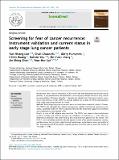Files in this item
Screening for fear of cancer recurrence : instrument validation and current status in early stage lung cancer patients
Item metadata
| dc.contributor.author | Lee, Yun-Hsiang | |
| dc.contributor.author | Hu, Chan-Chuan | |
| dc.contributor.author | Humphris, Gerry | |
| dc.contributor.author | Huang, I-Chin | |
| dc.contributor.author | You, Kai-Lin | |
| dc.contributor.author | Jhang, Sin-Yuan | |
| dc.contributor.author | Chen, Jin-Shing | |
| dc.contributor.author | Lai, Yeur-Hur | |
| dc.date.accessioned | 2020-05-25T15:30:02Z | |
| dc.date.available | 2020-05-25T15:30:02Z | |
| dc.date.issued | 2020-06 | |
| dc.identifier | 263664102 | |
| dc.identifier | 695f0a2f-330a-4043-ab9b-45b380b3dda8 | |
| dc.identifier | 85074412779 | |
| dc.identifier | 000535921400011 | |
| dc.identifier.citation | Lee , Y-H , Hu , C-C , Humphris , G , Huang , I-C , You , K-L , Jhang , S-Y , Chen , J-S & Lai , Y-H 2020 , ' Screening for fear of cancer recurrence : instrument validation and current status in early stage lung cancer patients ' , Journal of the Formosan Medical Association , vol. 119 , no. 6 , pp. 1101-1108 . https://doi.org/10.1016/j.jfma.2019.10.007 | en |
| dc.identifier.issn | 0929-6646 | |
| dc.identifier.other | RIS: urn:B513553ACA343A56D73DF8A08F003579 | |
| dc.identifier.other | ORCID: /0000-0002-4601-8834/work/65345289 | |
| dc.identifier.uri | https://hdl.handle.net/10023/19990 | |
| dc.description.abstract | Background Fear of cancer recurrence (FCR) is one of the most distressing concerns for cancer patients. A psychometrically validated brief scale is urgently needed for use in busy clinical oncology settings. This study aimed to (1) develop and validate the 7-item fear of cancer recurrence scale Chinese version (FCR7-C), and (2) explore the severity of FCR in post-operative early-stage lung cancer patients in Taiwan. Methods Early-stage lung cancer patients were recruited from a medical center in Taiwan. The FCR7-C was evaluated for content and construct validity and internal consistency reliability. Construct validity of FCR7-C was determined by the empirically supported correlation and confirmatory factor analysis (CFA). Results A total of 160 subjects were recruited. The FCR7-C was shown to have satisfactory content validity and internal consistency reliability (Cronbach's α = 0.9). The uni-dimensional structure was confirmed by CFA that showed a good fit for the model. The FCR7-C score correlates positively with the degree of most of the physical symptoms, anxiety, and depression, but correlates negatively with patient age, performance status, and quality of life. We found that 81.9% of patients reported at least some FCR, with a mean FCR severity of 15.18 (SD = 7.78). Conclusion FCR7-C is a brief screening tool with good psychometrics. Patients with early-stage lung cancer still revealed mild to moderate level of FCR. Applying the FCR7-C for to screen cancer patients’ distress and further develop personalized psychological interventions would be strongly suggested. | |
| dc.format.extent | 308915 | |
| dc.language.iso | eng | |
| dc.relation.ispartof | Journal of the Formosan Medical Association | en |
| dc.subject | Cancer | en |
| dc.subject | Psychological distress | en |
| dc.subject | Fear of cancer recurrence | en |
| dc.subject | Psychometrics | en |
| dc.subject | RC0254 Neoplasms. Tumors. Oncology (including Cancer) | en |
| dc.subject | NDAS | en |
| dc.subject | SDG 3 - Good Health and Well-being | en |
| dc.subject.lcc | RC0254 | en |
| dc.title | Screening for fear of cancer recurrence : instrument validation and current status in early stage lung cancer patients | en |
| dc.type | Journal article | en |
| dc.contributor.institution | University of St Andrews. Sir James Mackenzie Institute for Early Diagnosis | en |
| dc.contributor.institution | University of St Andrews. Population and Behavioural Science Division | en |
| dc.contributor.institution | University of St Andrews. WHO Collaborating Centre for International Child & Adolescent Health Policy | en |
| dc.contributor.institution | University of St Andrews. Health Psychology | en |
| dc.contributor.institution | University of St Andrews. St Andrews Sustainability Institute | en |
| dc.contributor.institution | University of St Andrews. School of Medicine | en |
| dc.identifier.doi | 10.1016/j.jfma.2019.10.007 | |
| dc.description.status | Peer reviewed | en |
This item appears in the following Collection(s)
Items in the St Andrews Research Repository are protected by copyright, with all rights reserved, unless otherwise indicated.

